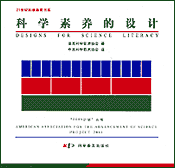
An electronic newsletter for the science education
community
Science Literacy in a Global Context
Project 2061 shares experiences, resources
with international educators
Guided by such broad-based goals as economic development, scientific and technological innovation, preparation for globalization, and increased awareness of health issues like HIV/AIDS prevention, countries around the world are asking questions about how to improve the science literacy of their citizens. What should science education for the 21st century look like? Which knowledge and skills do students need to achieve both personal and societal goals? Which key areas of the education system can stimulate the most change?
With 20 years of experience working to answer such questions in the U.S. context, AAAS Project 2061 has learned many lessons about long-term reform aimed at achieving science literacy for all. At conferences in China and Trinidad this past year, Project 2061’s deputy director Dr. George DeBoer shared some of those lessons with international educators and policymakers. He also fostered ongoing dialogue and collaboration that enriches Project 2061’s work here at home.
China: Building Scientific Literacy
The
International Forum on Scientific Literacy in Beijing
in July 2004 brought together scientists and educators from
many countries to exchange ideas on the theme of “Public
Scientific Literacy: Theory and Practice.” Sponsored
by the China Association
for Science and Technology (CAST)—a
non-profit, non-governmental organization of Chinese
scientific and technological workers—the forum provided
an opportunity for scholars from China, Japan, Korea,
India, Russia, Thailand, France, the United Kingdom, and
the United States to share their experiences and build international
collaborations. Topics included increasing public understanding
of science, science education reform, and the promotion
of scientific literacy through the mass media and science
centers.
As one of several keynote speakers who addressed efforts to achieve science literacy in their countries, Dr. DeBoer spoke about Project 2061’s goals-based approach to science education reform. He described the mission and history of Project 2061 as well as current efforts to develop the resources needed so that all students can achieve the knowledge and skills specified in Science for All Americans. An article based on his talk was later published in China Education Daily. During the forum, DeBoer was also appointed to serve as an international advisor to China’s National Scientific Literacy Action Plan, an effort to build science literacy among all Chinese citizens.
Following his talk at the forum in Beijing, Dr. DeBoer spent three days working in Qingdao with a select group of 300 science teachers from across China. DeBoer—along with Dr. James Minstrell, who heads FACET Innovations, and Dr. Joseph Krajcik, professor of science education at the University of Michigan—introduced the Chinese teachers to U.S. perspectives on science teaching. The Chinese system has historically been highly structured and not as open as the U.S. system to independent and creative thought on the part of students. Chinese educators are asking if the approach taken in the U.S. would lead to greater creativity and innovation in their society.
Project 2061’s participation in the Beijing forum continued a long-standing relationship between CAST and AAAS. CAST has been collaborating with China’s Popular Science Press to translate Project 2061’s resources into Chinese. In May, Madam Cheng Donghong, executive secretary of CAST, presented copies of the Chinese translation of Designs for Science Literacy to Project 2061 during a visit to Washington, DC. The Chinese translation of Atlas of Science Literacy is expected this summer, and translations of Science for All Americans, Benchmarks for Science Literacy, and Blueprints for Reform are already in print. CAST is currently looking to make resources from Project 2061’s Web site available online in Chinese.
Trinidad: Improving Science Education
In
February 2005, Dr. DeBoer traveled to Trinidad for the
Science Education Policy Forum sponsored by the UNESCO
Office for the Caribbean and the Ministry
of Education of Trinidad and Tobago. Participants discussed
directions and actions for the development of science and
science education policy in the region. The event also served
to launch a campaign to advance the Caribbean education
sector response to HIV/AIDS.
Dr. DeBoer addressed the issue of science education for the 21st century, sharing Project 2061’s experience with helping the U.S. educational community develop science education programs of the highest possible quality for all students. He discussed how student assessment, family and community outreach, and curriculum materials development can be particularly powerful levers for change in the educational system. Yet he underscored the importance of teachers’ and students’ support to the success of any reform effort. Without a reform vision that is consistent with teachers’ values and capabilities and without methods consistent with the nature of children and adolescents, change is unlikely.
The chief Project 2061 lesson that Dr. DeBoer shares when speaking with international educators is that changing a well-established educational system takes great care and persistence. The challenge is long-term and far-reaching. The keys to success? Offer a clear and uncomplicated message of what needs to change and why and engage the education system at all levels in ongoing, collaborative, and practical discussions on how to offer the best science education possible to the greatest number of people.
For Dr. DeBoer, outreach to other countries provides Project 2061 with an opportunity to share its work and gain new insights. “Science for All Americans has much in it that pertains to students around the world, not just in the United States. We are all interested in providing our students with the best education in science that we can, in having them learn about and be curious about how the natural world works,” says DeBoer. “Working with other countries also allows us to see how our ideas are received by others and forces us to answer questions that others have. It broadens our perspective on our own work when we can see it through others’ eyes.”
# # #
For more information about Project 2061’s international activities, please contact:
Deputy Director: Dr. George DeBoer, (202) 326-6624





